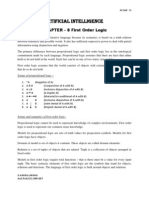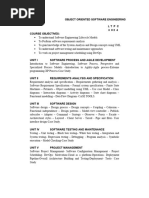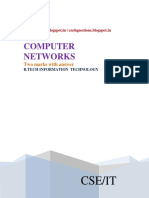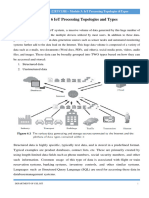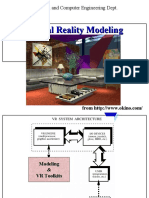100%(2)100% found this document useful (2 votes)
5K viewsOnline Search Agents
Online Search Agents
Uploaded by
Hari DeivasigamaniOnline search agents operate in unknown environments and must learn through interaction rather than pure computation. They interleave planning and action by first taking an action, observing the outcome, and using this information to plan their next action. Like hill-climbing search, online search agents keep only their current state in memory, acting locally to explore their environment through experimentation in real-time.
Copyright:
© All Rights Reserved
Available Formats
Download as PPTX, PDF, TXT or read online from Scribd
Online Search Agents
Online Search Agents
Uploaded by
Hari Deivasigamani100%(2)100% found this document useful (2 votes)
5K views13 pagesOnline search agents operate in unknown environments and must learn through interaction rather than pure computation. They interleave planning and action by first taking an action, observing the outcome, and using this information to plan their next action. Like hill-climbing search, online search agents keep only their current state in memory, acting locally to explore their environment through experimentation in real-time.
Original Title
ONLINE SEARCH AGENTS
Copyright
© © All Rights Reserved
Available Formats
PPTX, PDF, TXT or read online from Scribd
Share this document
Did you find this document useful?
Is this content inappropriate?
Online search agents operate in unknown environments and must learn through interaction rather than pure computation. They interleave planning and action by first taking an action, observing the outcome, and using this information to plan their next action. Like hill-climbing search, online search agents keep only their current state in memory, acting locally to explore their environment through experimentation in real-time.
Copyright:
© All Rights Reserved
Available Formats
Download as PPTX, PDF, TXT or read online from Scribd
Download as pptx, pdf, or txt
100%(2)100% found this document useful (2 votes)
5K views13 pagesOnline Search Agents
Online Search Agents
Uploaded by
Hari DeivasigamaniOnline search agents operate in unknown environments and must learn through interaction rather than pure computation. They interleave planning and action by first taking an action, observing the outcome, and using this information to plan their next action. Like hill-climbing search, online search agents keep only their current state in memory, acting locally to explore their environment through experimentation in real-time.
Copyright:
© All Rights Reserved
Available Formats
Download as PPTX, PDF, TXT or read online from Scribd
Download as pptx, pdf, or txt
You are on page 1of 13
ONLINE SEARCH AGENTS
• offline search algorithms -They compute a complete solution
before setting foot. in the real world and then execute the
solution
• Online search agent interleaves computation and action: first
it takes an action, then it observes the environment and
computes the next action
• Online search is a necessary idea for unknown environments,
where the agent does not know what states exist or what its
actions do.
• In this state of ignorance, the agent faces an exploration
problem and must use its actions as experiments in order to
learn enough to make deliberation worthwhile.
• The baby‘s gradual discovery of how the world works is, in
part, an online search process.
Online search problems
• An online search problem must be solved by an agent
executing actions, rather than by pure computation
• the agent knows only the following:
– ACTIONS(s), which returns a list of actions allowed in state s;
– The step-cost function c( s, a, s')-note that this cannot be used until
the agent knows that s' is the outcome; and
– GOAL-TEST(s).
Online search agents
• After each action, an online agent receives a percept telling it
what state it has reached; from this information, it can
augment its map of the environment.
• The current map is used to decide where to go next.
• This interleaving of planning and action means that online
search algorithms are quite different from the offline search
algorithms
Online local search
• Like depth-first search, hill-climbing search has the property
of locality in its node expansions.
• In fact, because it keeps just one current state in memory, hill-
climbing search is already an online search algorithm
• Instead of random restarts, one might consider using a
random walk to explore the environment.
• A random walk simply selects at random one of the available
actions from the current state
• preference can be given to actions that have not yet been
tried. It is easy to prove that a random walk will eventually
find a goal or complete its exploration, provided that the
space is finite
• Learning Real time A *. An LRTA* agent is guaranteed to find a
goal in any finite, safely explorable environment.
You might also like
- PPL Complete Notes JntuhDocument125 pagesPPL Complete Notes JntuhAngel SweetyNo ratings yet
- AI Module 1, 2 Notes 4 TH Sem UpdatedDocument41 pagesAI Module 1, 2 Notes 4 TH Sem UpdatedAkhilNo ratings yet
- Unit I - Part I NotesDocument33 pagesUnit I - Part I NotesManju Ancy John Immanuel100% (7)
- Deep Learning R18 Jntuh Lab ManualDocument21 pagesDeep Learning R18 Jntuh Lab Manualnphotographer990% (1)
- Machine Learning Unit 1Document112 pagesMachine Learning Unit 1Aanchal Padmavat100% (7)
- OOSE Notes 1 PDFDocument108 pagesOOSE Notes 1 PDFpraveen kumar100% (3)
- AI UNIT-3 Knowledge RepresentationDocument58 pagesAI UNIT-3 Knowledge RepresentationPriyansh Gupta100% (1)
- Question Bank: Subject Name: Artificial Intelligence & Machine Learning Subject Code: 18CS71 Sem: VIIDocument8 pagesQuestion Bank: Subject Name: Artificial Intelligence & Machine Learning Subject Code: 18CS71 Sem: VIIDileep Kn100% (2)
- 2.9 Reasoning Systems For Categories, Reasoning With Default InformationDocument12 pages2.9 Reasoning Systems For Categories, Reasoning With Default InformationAnime Geeker100% (2)
- CS2351 - Artificial Intelligence-2 MarksDocument16 pagesCS2351 - Artificial Intelligence-2 MarksVignesh Vicky100% (1)
- Digital Image Processing Notes VtuDocument72 pagesDigital Image Processing Notes VtuNikhil KumarNo ratings yet
- Unit 4Document57 pagesUnit 4Poongodi100% (3)
- Artificial Intelligence Unit-4 First Order LogicDocument11 pagesArtificial Intelligence Unit-4 First Order LogicMukesh100% (2)
- Unit-2.4 Searching With Partial Observations - CSPs - Back TrackingDocument42 pagesUnit-2.4 Searching With Partial Observations - CSPs - Back Trackingmani111111100% (1)
- ML GTU SolutionDocument83 pagesML GTU SolutionDIGVIJAY SINH CHAUHANNo ratings yet
- S MapReduce Types FormatsDocument22 pagesS MapReduce Types FormatsLokedhNo ratings yet
- Ai Viva QuestionsDocument9 pagesAi Viva QuestionsPritesh Bora100% (2)
- 21cs644 Module 3Document95 pages21cs644 Module 3gmaheshreddy229No ratings yet
- CCS356 Oose SyllabusDocument1 pageCCS356 Oose SyllabusSubbalakshmi Perumalsamy100% (1)
- 1) Explain in Detail Core Function of Edge Analytics With DiagramDocument13 pages1) Explain in Detail Core Function of Edge Analytics With DiagramsarakeNo ratings yet
- AI Unit-3 NotesDocument23 pagesAI Unit-3 NotesRajeev SahaniNo ratings yet
- Anatomy of Mapreduce Job Run: Some Slides Are Taken From Cmu PPT PresentationDocument73 pagesAnatomy of Mapreduce Job Run: Some Slides Are Taken From Cmu PPT PresentationRajesh Kumar RakasulaNo ratings yet
- CS3491 Artificial Intelligence and Machine Learning Nov Dec 2023 Question Paper DownloadDocument2 pagesCS3491 Artificial Intelligence and Machine Learning Nov Dec 2023 Question Paper DownloadGiruba100% (1)
- Cs3551 Distributed Computing L T P CDocument2 pagesCs3551 Distributed Computing L T P CR.V.Lakshmi Priya Assistant Professor - IT100% (1)
- Module - 1 Notes - SEPM (21CS61)Document29 pagesModule - 1 Notes - SEPM (21CS61)Gagan V hallurNo ratings yet
- Counting Ones in A WindowDocument11 pagesCounting Ones in A WindowDHRUV SINGHALNo ratings yet
- CS6551 Computer Networks Two Mark With AnswerDocument35 pagesCS6551 Computer Networks Two Mark With AnswerPRIYA RAJI100% (7)
- Distributed Computing Question PaperDocument2 pagesDistributed Computing Question Paperatul211988No ratings yet
- Viva QuestionsDocument37 pagesViva QuestionsBrynal Correia100% (1)
- Unit 2Document48 pagesUnit 2Bhargav RajNo ratings yet
- State Testing, and Testability Tips. Power of A Matrix, Node Reduction AlgorithmDocument13 pagesState Testing, and Testability Tips. Power of A Matrix, Node Reduction AlgorithmSeerapu RameshNo ratings yet
- Data Analytics Unit 3 NotesDocument28 pagesData Analytics Unit 3 NotesSmash art boy100% (2)
- Module-02 AIML 21CS54Document27 pagesModule-02 AIML 21CS54Deepali Konety67% (3)
- Goal Stack PlanningDocument10 pagesGoal Stack Planning321126510L03 kurmapu dharaneeswar100% (6)
- Learning in Artificial IntelligenceDocument8 pagesLearning in Artificial IntelligenceR Ravi Teja67% (3)
- 21cs54-Module 1Document15 pages21cs54-Module 1Deepali KonetyNo ratings yet
- Internship PresentationDocument16 pagesInternship PresentationG n MeghanaNo ratings yet
- Data Mining NotesDocument75 pagesData Mining NotesAravind RossiNo ratings yet
- Characteristics of Soft ComputingDocument11 pagesCharacteristics of Soft ComputingSiva88% (8)
- CN Lab Viva QuestionsDocument4 pagesCN Lab Viva QuestionsChetan Raj100% (3)
- NLP Question Paper SolutionDocument27 pagesNLP Question Paper SolutionSruja KoshtiNo ratings yet
- IR Question BankDocument29 pagesIR Question BankAmaya Ema100% (2)
- 21CSL66 Lab ManualDocument60 pages21CSL66 Lab ManualdeepakchabriNo ratings yet
- OS Question Bank - All Modules - II ND YearDocument8 pagesOS Question Bank - All Modules - II ND YearVamshidhar Reddy100% (2)
- Dbms Vtu NotesDocument104 pagesDbms Vtu NotessatyaNo ratings yet
- Conceptual Dependency in Artificial IntelligenceDocument34 pagesConceptual Dependency in Artificial IntelligenceKrishanaKantPareek100% (6)
- Designing A Learning SystemDocument12 pagesDesigning A Learning SystemPooja DixitNo ratings yet
- Software Testing Viva Questions and Answer Mca Sem5Document11 pagesSoftware Testing Viva Questions and Answer Mca Sem5Unknown100% (5)
- Specialized Process Models: Muhammad NomanDocument20 pagesSpecialized Process Models: Muhammad NomanMohammad NomanNo ratings yet
- CS3491 Ai Lab Manula R2021 FinalDocument43 pagesCS3491 Ai Lab Manula R2021 FinalShamilie M100% (3)
- Image and Video AnalyticsDocument3 pagesImage and Video AnalyticsJetlin C PNo ratings yet
- AI & DS - AD3351 DAA - 2marks (Unit 1 & 2) Question BankDocument7 pagesAI & DS - AD3351 DAA - 2marks (Unit 1 & 2) Question BankDHANYANo ratings yet
- State Space Search: Water Jug ProblemDocument14 pagesState Space Search: Water Jug ProblemTariq Iqbal100% (2)
- AO Star AlgorithmDocument5 pagesAO Star AlgorithmMitesh VyasNo ratings yet
- Artificial Intelligence Unit-2 Solving Problems by SearchingDocument11 pagesArtificial Intelligence Unit-2 Solving Problems by SearchingMukeshNo ratings yet
- r18 - Big Data Analytics - Cse (DS)Document1 pager18 - Big Data Analytics - Cse (DS)aarthi dev0% (1)
- DBMS UNIT-3 NotesDocument45 pagesDBMS UNIT-3 NotesMr. RAVI KUMAR I100% (3)
- Module-3 IoT NotesDocument9 pagesModule-3 IoT NotesNeetha DasNo ratings yet
- Lecture3 - 3 - Structure of AgentsDocument22 pagesLecture3 - 3 - Structure of AgentsSurekha Sakhare0% (1)
- Lecture Intelligent AgentsDocument31 pagesLecture Intelligent AgentsawnuvpewgcwxqdutluNo ratings yet
- Search 041005Document39 pagesSearch 041005Hari DeivasigamaniNo ratings yet
- Output Devices: Graphics, 3-D Sound, Haptics and OlfactoryDocument160 pagesOutput Devices: Graphics, 3-D Sound, Haptics and OlfactoryHari DeivasigamaniNo ratings yet
- Virtual Reality ModelingDocument163 pagesVirtual Reality ModelingHari DeivasigamaniNo ratings yet
- Augmented Reality and Virtual Reality For GamingDocument10 pagesAugmented Reality and Virtual Reality For GamingHari DeivasigamaniNo ratings yet
- Computing Architectures For Virtual Reality: Electrical and Computer Engineering DeptDocument136 pagesComputing Architectures For Virtual Reality: Electrical and Computer Engineering DeptHari Deivasigamani100% (1)
- Virtual Reality App DevelopmentDocument19 pagesVirtual Reality App DevelopmentHari DeivasigamaniNo ratings yet
- Input Devices: Trackers, Navigation and Gesture InterfacesDocument108 pagesInput Devices: Trackers, Navigation and Gesture InterfacesHari Deivasigamani100% (1)
- Tracking: Augmented Reality - Principles and PracticeDocument13 pagesTracking: Augmented Reality - Principles and PracticeHari DeivasigamaniNo ratings yet
- Chapter 1Document32 pagesChapter 1Hari DeivasigamaniNo ratings yet
- Displays: Augmented Reality - Principles and PracticeDocument44 pagesDisplays: Augmented Reality - Principles and PracticeHari DeivasigamaniNo ratings yet
- Arvr QBDocument5 pagesArvr QBHari DeivasigamaniNo ratings yet
- Unit I Ar VRDocument20 pagesUnit I Ar VRHari DeivasigamaniNo ratings yet












